How Sega became one of the biggest names in PC gaming
Sega’s not just about blue hedgehogs – it’s also behind some of the biggest PC games
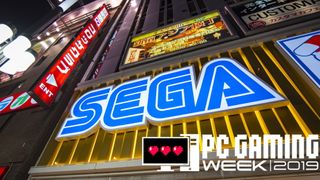
A few decades ago, if someone mentioned Sega, you’d likely think about a certain speedy blue hedgehog. Throughout the ‘90s, Sega influenced a whole generation of gamers with its console and arcade hardware and games. The Japanese company made some of the finest – and most iconic - games of the 8-bit and 16-bit era, and schoolyards around the world were divided between those who played on Sega consoles, and those that favored Nintendo’s.
However, despite its success in the early ‘90s, by the time the 32-bit era rolled around – which saw the arrival of a new competitor in the shape of Sony and its all-conquering PlayStation – Sega’s fortunes began to wane.
The release of the Dreamcast in 1998 saw Sega produce its most innovative console ever – but it wasn’t enough to win back gamers. Sales were lacklustre, and the Dreamcast – which many people now feel was ahead of its time – was to be the last home console Sega would release.
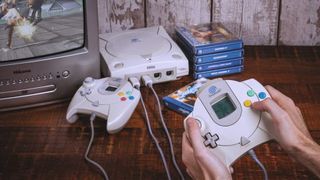
However, that didn’t mean that Sega was leaving the gaming business. Instead, it became a software-focused company, releasing games on pretty much every platform – even those belonging to old enemies like Nintendo and Sony.
Meanwhile, something rather amazing happened. Sega became one of the biggest names in PC gaming.
So, how did Sega go from failed console maker to one of the biggest publishers on PC? As part of TechRadar’s PC Gaming Week 2019, we chatted to Gary Dale, President of Sega Europe and Anna Downing, VP of Marketing for Sega Europe, about this remarkable turnaround.
Creative control
While Sega’s success in the PC gaming market didn’t happen overnight, Dale pinpoints the pivotal moment for Sega. “I think that the initial acquisition of Creative Assembly, which was in 2005 by Sega Europe, was the first kind of big move for Sega to get to own a big IP in Total War, and a studio in Creative Assembly, that had this kind of very high level PC capability.”
Get daily insight, inspiration and deals in your inbox
Get the hottest deals available in your inbox plus news, reviews, opinion, analysis and more from the TechRadar team.
Creative Assembly is a British video game developer, which was founded in 1987. It started life porting Amiga and ZX Spectrum games to MS-DOS – but it became one of the most well-known developers in PC gaming when it struck gold in 2000 with the release of its critically acclaimed Shogun: Total War strategy game.
That game led to the popular Total War series of games, which has since gone on to be one of the most popular series of games on PC.
After acquiring Creative Assembly, Sega seemed to get a taste for building its PC portfolio. “It was followed by the acquisition of Sports Interactive, which is another PC-focused game studio,” explains Dale. “And as those studios evolved, I think the strategy then led to further explore those opportunities. It's also led to the subsequent acquisition of Relic in Vancouver and of Amplitude in Paris. Then, we acquired the Black Sea studio from Crytek, which is based in Sofia, and that is part of the Creative Assembly team now.”
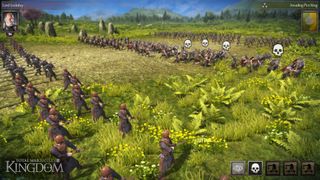
So, the Sega of today has some of the most respected developers of PC games – and it all started with that acquisition of Creative Assembly, and what Sega learned from it.
As Dale explains, “through that initial acquisition of Creative Assembly we started to understand more about the PC business, and that became a greater appetite in terms of Sega Europe.” Moving to such a PC-orientated series as Total War was a real learning experience for Sega. “I think through that acquisition,” Dale continues, “it gave a deeper understanding of the PC market, because previously Sega had obviously had a history within the console business.”
"We started to understand more about the PC business, and that became a greater appetite in terms of Sega Europe."
Gary Dale, President of Sega Europe
Of course, in many ways creating games for PC is quite similar to consoles. “As with any game, you need to understand who are the people who will enjoy playing it? And how do you create the content that they're going to love? Once you understand that, you work with studios that have a passion and an ability to be able to great those games.”
The success of Sega and Creative Assembly’s partnership is what, in Dale’s view, “led to the strategy that we're on, which is the development and acquisition of very high quality IP, through very high quality studios. That's where we are today, and that is very much what our future plans are as well.”
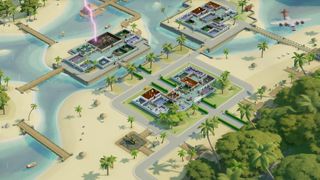
Playing doctors and nurses
Speaking of where Sega is today, earlier this year the company announced another acquisition that further cements its position as a dominant player in PC gaming, with Two Point Studios joining the family.
Although relatively new, having been founded in 2016, Two Point Studios is another studio with a fine pedigree in PC gaming. It was set up by Ben Hymers, Mark Webley and Gary Carr – with Webley and Carr having worked for Bullfrog Productions and Lionhead Studios.
Those studios were responsible for some of the most celebrated – and iconic – PC games ever made, including Theme Park, Theme Hospital and Black & White. In 2017, Two Point Studios signed a publishing partnership with Sega to produce a simulation game, which turned into the brilliant Two Point Hospital, which is a spiritual successor to Theme Hospital.
So, how did that partnership come about? “We have a group within the Sega Europe UK operation, Dale explains, “which is called Search Light, that develops third party relationships on an incubation style-relationship. So, the relationship with Two Point Studios came about through our Search Light team. And as the relationship grew, as we launched the product together, the next logical step for both the team at Two Point – and for ourselves – was to acquire the studio and make Two Point part of the Sega Europe family.”
There are echoes of Sega’s acquisition of Creative Assembly with its relationship with Two Point Studios. Both are studios that are primarily PC-led – though Dale is keen to stress that that doesn’t necessarily mean Two Point Studios will simply focus on PC games in the future.
So, with Two Point Hospital shipped, what is the team working on now? “They've got a couple of projects they are working on right now,” reveals Dale, “and one of them is the continued support for Two Point Hospital. We had a great reaction from the community, and we will continue to support it.”
"We are open to meet any new developers that are interested in creating great new games."
Gary Dale
Shining a search light
Sega’s relationship with Two Point Studios came about thanks to the Search Light team. But how does it work?
“The Search Light group actively look to meet teams from all over the world, who are people who have a passion for making certain types of games,” explains Dale.
“We meet lots of people, and through that, we look to build very specific relationships. In the ideal world those relationships will then go on to form a longer-term arrangement with the company. So, we are open to meet any new developers that are interested in creating great new games.”

PC gaming is changing – and so is Sega
It’s certainly an exciting time for PC gaming, and with ever more powerful hardware coming out, alongside new game streaming services launching, it looks like there could be a revolution in PC gaming – and Sega is ready for it.
“It’s such an exciting time right now,” observes Anna Downing. “We recently announced that Football Manager 2020 will be on Google Stadia, and we have Football Manager 19 announced for Microsoft Xbox Game Pass. So, for us, it's a really exciting time, and certainly for the PC market.”
What’s particularly exciting for Sega, according to Downing, is how these new game streaming services are allowing publishers to get their games in the hands of people who may not have been able to play them previously. “There were many great opportunities that are now on the table for us where we can reach consumers where, potentially, we've not had the opportunity to previously.”
"It's a really exciting time, certainly for the PC market."
Anna Downing, VP of Marketing
Bringing Football Manager 19 to Xbox Game Pass for PC, Microsoft’s subscription service, seems to be a particularly big win for both Microsoft and Sega due to both the popularity of the franchise, and the rapid growth of Microsoft’s service, which has been getting plaudits from both gamers and reviewers thanks to the sheer value for money it offers – where for a flat monthly fee, subscribers have access to hundreds of PC games for as long as they subscribe. It could really change the way PC gamers pay for and play their games.
Downing agrees. “Yeah, absolutely. I think Microsoft launched with a fantastic offer. So, you know, the more people that that can get on board initially, I think it sets itself up really well for the future. And as I said, hopefully for us it opens up opportunities to reach a broader audience and new consumers.”
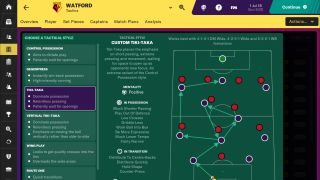
Downing has been working on Football manager, which she calls a “phenomenal franchise to be associated with,” for 11 years now – and has seen how Sega’s involvement with such a beloved franchise, and its committed fans, has benefitted both the company and gamers.
It’s something Sega has also noticed with its other huge PC game franchise, Total War, which seems to be going from strength to strength with each new release. “Again, it’s just a very popular brand,” notes Dale. “We have a very strong worldwide core audience with that game. Plus, the different types of iterations we put out always get a very strong, reception. We've just launched Total War Three Kingdoms, and that's one of the best launches we've ever had on a Total War game.”
“Yes, we sold through a million units quite early on in the life cycle,” adds Downing. “Leading up to its actual launch, it was our highest pre-ordered Total War game. And, once the game was actually released, the momentum maintained.”
What’s particularly noticeable about Total War is its global appeal. “We've seen fantastic sales, predominantly from the Asian market,” states Downing, “as the content of the game resonated really well with those territories.”
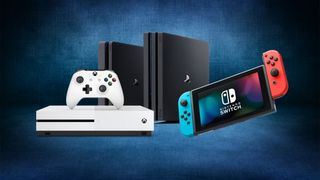
PC versus consoles
There’s no doubt that Sega’s move to PC gaming has been an incredibly successful one, but did it encounter any unique opportunities – or problems – when comparing the PC games market, compared to the console market?
“That's a good question,” says Dale. “On some levels they work in a different way, in terms of the relationship with the first party on the console side, and a more open platform on the PC. But in terms of how users respond to great content – which is what is most important to us – making a great game for a console or making a great game for PC, it’s the same.”
It makes sense. No one wants to play a bad game, and PC gamers and console gamers both have one thing in common: they love games. “What you've got to think about more than anything is the user,” continues Dale, “and how they're going to react to what you're doing. So on one level, there are differences between the two markets, but on certain levels, there are huge similarities as well.”
Another thing that unites PC and console games is that you get very passionate, very vocal people, and they will tell you when they love a game – and when they hate one.
Dale also suggests that we’re seeing more of a blurring between PC and console games these days. “You now see many games that will cross all of the platforms, you know. There are a lot of examples of games that we may have led on PC and then gone to console, or they may have led on console, and then moved to PC. Or they have had a simultaneous release across multiple platforms.”
A good example of this, as Downing points out, is Football Manager. While it is traditionally thought of as a PC game, “in the last couple of years, we also had the opportunity to be able to release the title on Nintendo Switch,” which gave Sega “the opportunity to take the game to a new broader audience.”
That doesn’t mean that we’re not going to see any more PC exclusive games from Sega, though. Take Total War, for example, a deeply strategic game. “What we’re finding these days,” explains Dale, “is that with Total War, which is a real time strategy game, the PC is where you’d want to play it.”
It also seems like Sega is bringing its console expertise to PC gaming. We shouldn’t think that big, cinematic games are only available on consoles these days. “From a visual point of view, we've had fantastic feedback in terms of really taking Total War to the next level in terms of that visual impact and what you're playing. So I don't think that the big screen experience is just limited to consoles.”
With streaming services like Stadia and GeForce Now, it looks like an increasing number of people will be playing PC games on their big TVs. And with companies like Sega at the forefront, we could see the perfect marriage of PC and console gaming in the future – a glorious mix of depth, strategy and bombast.
Welcome to TechRadar's PC Gaming Week 2019. We're celebrating the most powerful gaming platform on Earth with in-depth articles, exclusive interviews and essential buying guides that showcase everything PC gaming has to offer. Visit our PC Gaming Week 2019 page to see all our coverage in one place.
- These are the best PC games of 2019

Matt is TechRadar's Managing Editor for Core Tech, looking after computing and mobile technology. Having written for a number of publications such as PC Plus, PC Format, T3 and Linux Format, there's no aspect of technology that Matt isn't passionate about, especially computing and PC gaming. Ever since he got an Amiga A500+ for Christmas in 1991, he's loved using (and playing on) computers, and will talk endlessly about how The Secret of Monkey Island is the best game ever made.
